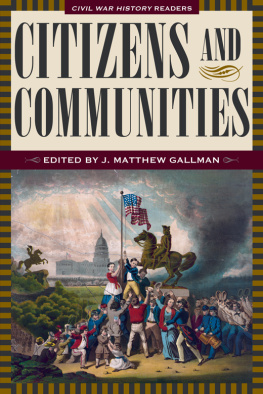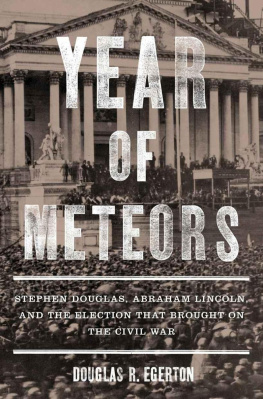The Cacophony of Politics
A Nation Divided: Studies in the Civil War Era
Orville Vernon Burton and Elizabeth R. Varon, Editors
University of Virginia Press
Charlottesville and London
University of Virginia Press
2021 by the Rector and Visitors of the University of Virginia
All rights reserved
Printed in the United States of America on acid-free paper
First published 2021
1 3 5 7 9 8 6 4 2
Library of Congress Cataloging-in-Publication Data
Names: Gallman, J. Matthew (James Matthew), author.
Title: The cacophony of politics : Northern Democrats and the American Civil War / J. Matthew Gallman.
Description: Charlottesville : University of Virginia Press, 2021. | Series: A nation divided : studies in the Civil War era | Includes bibliographical references and index.
Identifiers: LCCN 2021018724 (print) | LCCN 2021018725 (ebook) | ISBN 9780813946566 (hardcover) | ISBN 9780813946573 (ebook)
Subjects: LCSH: Democratic Party (U.S.)History19th century. | Political partiesUnited StatesHistory19th century. | Opposition (Political science)United StatesHistory19th century. | Politics and warUnited States. | United StatesPolitics and government18611865. | United StatesHistoryCivil War, 18611865.
Classification: LCC E459 .G28 2021 (print) | LCC E459 (ebook) | DDC 324.2736/09034dc23
LC record available at https://lccn.loc.gov/2021018724
LC ebook record available at https://lccn.loc.gov/2021018725
Cover art: Engraved envelope by F. K. Kimmel. (Schuyler Rumsey Philatelic Auctions)
To the nations nurses, technicians, orderlies, and medical staff
Contents
The idea for this book emerged at one of the national conferences, probably over adult beverages. I am pretty sure that Gary Gallagher first suggested the strange idea that I should write about Civil War politics. Many conversations followed.
I am very proud to say that over the years I have become increasingly adept at seeking smart advice, some portion of which I follow. In the earliest stages, Bill Blair and Mark E. Neely Jr. offered wonderful thoughts in long emails.
As the project matured from vague notions to concrete research, I profited immensely from three research fellowships and a grant from the University of Florida. I was pleased to return to the Huntington Library, where I mined the wonderful manuscript collections. Thanks to Olga Tsapina for her wise counsel, Steve Hindle for his intellectual generosity, and Carolyn Powell for her characteristic assistance. I visited the Kentucky Historical Society in search of material on Willie Waller and ended up finding a wealth of other sources as well. Patrick Lewis and Stephanie Lang were wonderful hosts and guides. While in Kentucky I enjoyed a marvelous excursion with LeeAnn Whites to Maysville and the Kentucky Gateway Museum. It was a particular pleasure to return to my old stomping grounds in Philadelphia as a fellow at the Library Company of Philadelphia and the Historical Society of Pennsylvania. Thanks to Jim Green for his warmth and wisdom, and special thanks to Cornelia King and Erika Piola. While in Philadelphia I spent good times talking history with Judy Giesberg and with John Hill. Thanks to Tara Craig of the Columbia Rare Book and Manuscript Library and to Brooks Tucker Swett, who photographed the Anna Mercer LaRoche journals.
Several colleagues took time to answer a quick email. Thanks to Matt Hulbert, Ryan Keating, Will Kurtz, Tim Wesley, Jack Furniss, Anne Marshall, Stephanie McCurry, Scott Hancock, Frank Towers, and Kid Wongsrichanalai, who all set aside their own work to answer a query or offer counsel. Thanks to Jennifer Weber for a fine book exhibit chat about Democrats. Dan Sutherland and Bob Sandow each read a chapter, improving my work and saving me from error.
Quite a few friends and colleagues plowed through the entire manuscript at some stage. Thanks to Jeff Adler, Gary Gallagher, Carrie Janney, Steve Maizlish, Louise Newman, Tom Pegram, Mark Simpson-Vos, Joan Waugh, and Jonathan White, who all read the book and offered suggestions, large and small. Thanks especially to Liz Varon, who read the whole thing twice, including as an editor of the series, and to Vernon Burton, who stepped in with a detailed comment as series co-editor. And to the University of Virginias Nadine Zimmerli, who commented on the entire manuscript. Thanks as well to two fine anonymous readers.
After many years of research and thought I began writing this book on a summer day while I was recovering from an unanticipatedand extendedvisit to the cardiology wing at North Florida Regional Medical Center. It seemed to be a good idea to start writing since I was in for an extended recovery, and they would not let me drive. At that point I owed considerable debts to many nurses, medical technicians, and orderlies. (There were also considerable debts to many doctors.) Since that day I have accumulated more debts to nurses and technicians. As I finish this project, a bit more than two years later, I join the chorus of folks worldwide thanking many thousands of nurses and medical staff for their sacrifices. This book is dedicated to all of those amazing professionals.
1860
November 6 Abraham Lincoln is elected president.
1861
March 4 The Senate passes the proposed Corwin Amendment.
March 4 Lincoln delivers his First Inaugural Address.
April 12 South Carolina guns fire on Fort Sumter.
April 19 Baltimoreans riot on Pratt Street.
May 25 John Merryman is arrested in Maryland.
May 31 Joseph Holt writes to the people of Kentucky.
June 3 Stephen Douglas dies in Chicago.
August 19 Pierce Butler is arrested in Philadelphia.
1862
March 6 Charles Biddle delivers Alliance with the Negro in Congress.
June 6 Sunset Cox asks Congress, Is Ohio to be Africanized?
July 8 George McClellan hands Harrisons Landing Letter to Lincoln.
July 17 Congress passes the State Militia Act.
September 3 Edward G. Ryan delivers his Address to Wisconsin Democrats.
September 22 Lincoln issues the Preliminary Emancipation Proclamation.
November 10 Draft rioting erupts in Port Washington, Wisconsin.
1863
January 1 Lincoln issues the Emancipation Proclamation.
January 14 Clement Vallandigham gives a fiery final address to Congress.
February 6 The Society for the Diffusion of Political Knowledge (SDPK) forms in New York City.
March 3 Congress passes the Enrollment Act.
April 12 Captain Matthew H. Jouett signs a pass for Lavendar Hale.
April 13 Ambrose Burnside issues General Order no. 38.
May 4 Mayor Francis Sherman gives his inaugural address in Chicago.
May 5 Clement Vallandigham is arrested in Ohio.
May 7 Willie Waller is arrested in Kentucky.
May Angry crowds visit the Philadelphia Age office.
June 1 Burnside orders the Chicago Times shut down.
June 12 Abraham Lincoln writes to Erastus Corning and others.
July 13 The Battle of Gettysburg
July 4 Vicksburg falls to Union forces.






